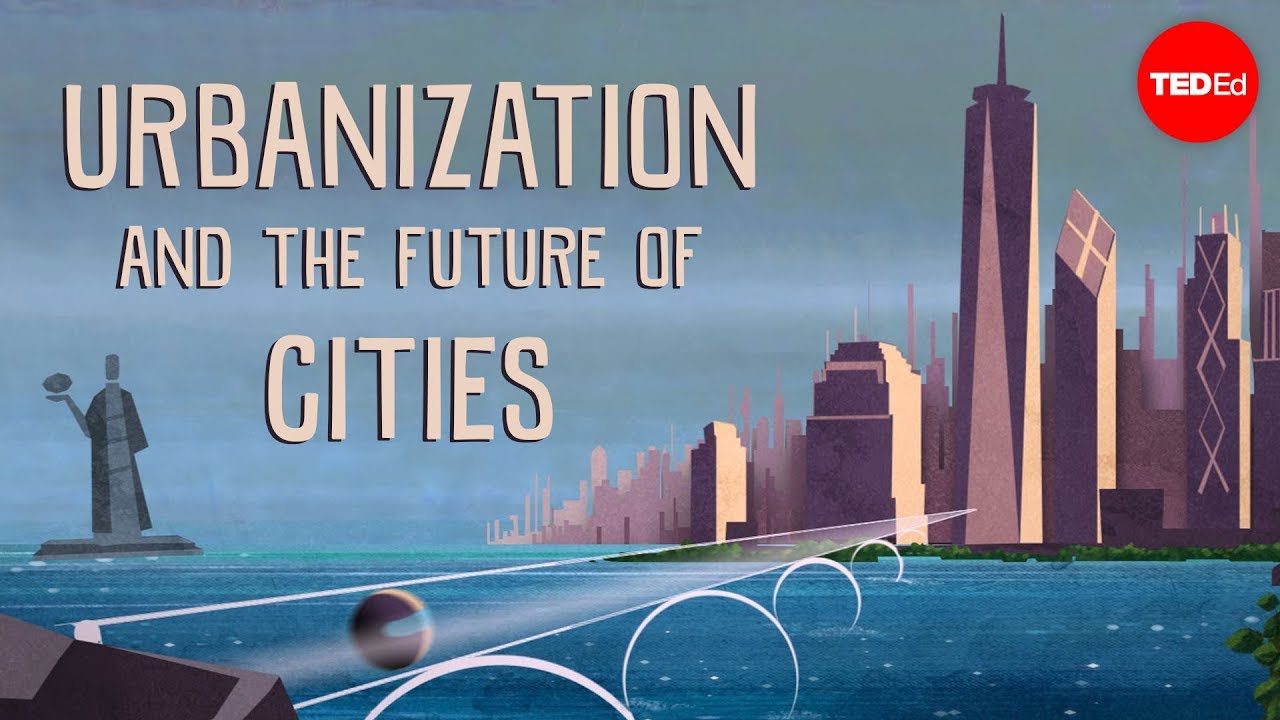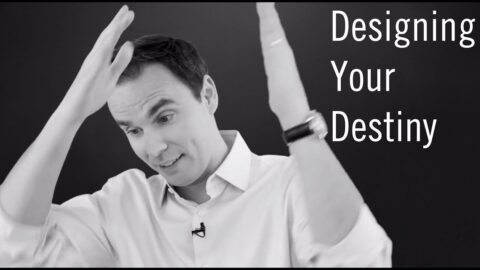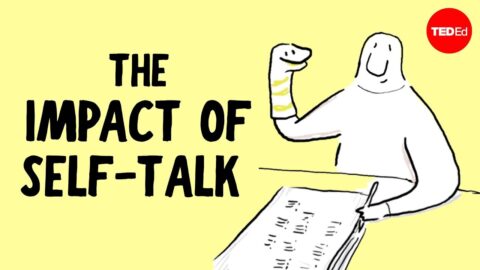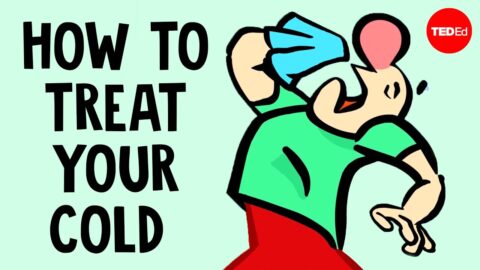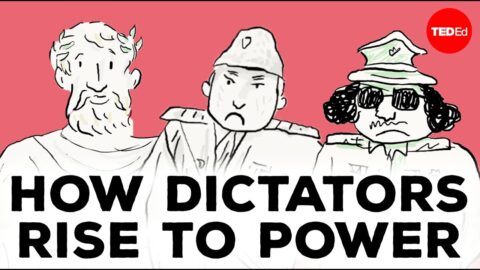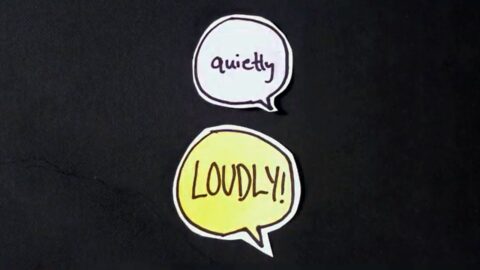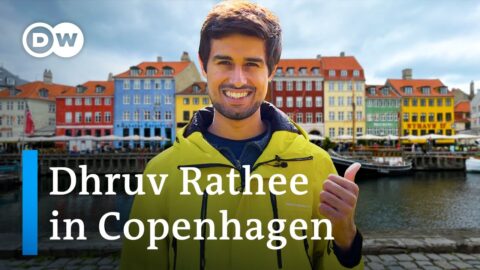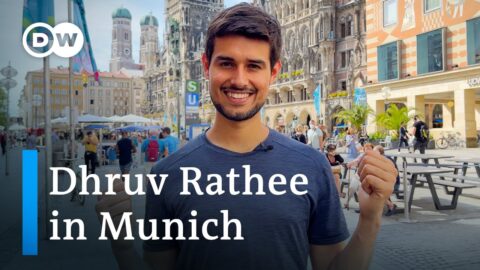Today ,more than half of all people in the world
Hoje, mais da metade de todas as pessoas no mundo
live in an urban area.
morar em uma área urbana.
By mid-century, this will increase to 70%.
Até meados do século, esse número aumentará para 70%.
But as recently as 100 years ago,
Mas há apenas 100 anos,
only two out of ten people lived in a city,
apenas duas em cada dez pessoas viviam numa cidade,
and before that, it was even less.
e antes disso era ainda menos.
How have we reached
Como chegamos
such a high degree of urbanization,
um grau tão elevado de urbanização,
and what does it mean for our future?
e o que isso significa para o nosso futuro?
In the earliest days of human history,
Nos primeiros dias da história humana,
humans were hunter-gatherers,
os humanos eram caçadores-coletores,
often moving from place to place
frequentemente se mudando de um lugar para outro
in search of food.
em busca de comida.
But about 10,000 years ago,
Mas há cerca de 10.000 anos,
our ancestors began to learn the secrets
nossos ancestrais começaram a aprender os segredos
of selective breeding
de criação seletiva
and early agricultural techniques.
e técnicas agrícolas primitivas.
For the first time,
Pela primeira vez,
people could raise food
as pessoas poderiam cultivar alimentos
rather than search for it,
em vez de procurá-lo,
and this led to the development
e isso levou ao desenvolvimento
of semi-permanent villages
de aldeias semipermanentes
for the first time in history.
pela primeira vez na história.
"Why only semi-permanent?" you might ask.
"Por que apenas semipermanente?", você pode perguntar.
Well, at first, the villages still had to relocate
Bem, no início, as aldeias ainda tiveram que se mudar
every few years
a cada poucos anos
as the soil became depleted.
à medida que o solo se esgotava.
It was only with the advent of techniques
Foi somente com o advento das técnicas
like irrigation and soil tilling
como irrigação e cultivo do solo
about 5,000 years ago
cerca de 5.000 anos atrás
that people could rely on a steady
que as pessoas pudessem contar com uma estabilidade
and long-term supply of food,
e fornecimento de alimentos a longo prazo,
making permanent settlements possible.
tornando possíveis assentamentos permanentes.
And with the food surpluses
E com os excedentes de alimentos
that these techniques produced,
que essas técnicas produziram,
it was no longer necessary for everyone to farm.
não era mais necessário que todos cultivassem.
This allowed the development
Isto permitiu o desenvolvimento
of other specialized trades,
de outros ofícios especializados,
and, by extension, cities.
e, por extensão, cidades.
With cities now producing surplus food,
Com as cidades agora produzindo excedentes de alimentos,
as well as tools,
bem como ferramentas,
crafts,
artesanato,
and other goods,
e outros bens,
there was now the possibility of commerce
havia agora a possibilidade de comércio
and interaction over longer distances.
e interação em distâncias maiores.
And as trade flourished,
E à medida que o comércio florescia,
so did technologies that facilitated it,
assim como as tecnologias que o facilitaram,
like carts,
como carrinhos,
ships,
navios,
roads,
estradas,
and ports.
e portos.
Of course, these things required even more labor
Claro que essas coisas exigiam ainda mais trabalho
to build and maintain,
para construir e manter,
so more people were drawn
então mais pessoas foram atraídas
from the countryside to the cities
do campo para as cidades
as more jobs and opportunities
à medida que mais empregos e oportunidades
became available.
ficou disponível.
If you think modern cities are overcrowded,
Se você acha que as cidades modernas são superlotadas,
you may be surprised to learn
você pode se surpreender ao saber
that some cities in 2000 B.C. had population densities
que algumas cidades em 2000 a.C. tinham densidades populacionais
nearly twice as high as that of Shanghai or Calcutta.
quase duas vezes maior que a de Xangai ou Calcutá.
One reason for this
Uma razão para isso
was that transportation was not widely available,
era que o transporte não estava amplamente disponível,
so everything had to be within walking distance,
então tudo tinha que estar a uma curta distância,
including the few sources of clean water
incluindo as poucas fontes de água limpa
that existed then.
que existiam então.
And the land area of the city
E a área terrestre da cidade
was further restricted by the need for walls
foi ainda mais restringida pela necessidade de muros
to defend against attacks.
para se defender de ataques.
The Roman Empire was able to develop infrastructure
O Império Romano foi capaz de desenvolver infraestrutura
to overcome these limitations,
para superar essas limitações,
but other than that,
mas fora isso,
modern cities as we know them,
cidades modernas como as conhecemos,
didn't really get their start
não tiveram realmente o seu início
until the Industrial Revolution,
até a Revolução Industrial,
when new technology deployed on a mass scale
quando uma nova tecnologia é implantada em grande escala
allowed cities to expand and integrate further,
permitiu que as cidades se expandissem e se integrassem ainda mais,
establishing police,
estabelecimento de polícia,
fire,
fogo,
and sanitation departments,
e departamentos de saneamento,
as well as road networks,
bem como redes rodoviárias,
and later electricity distribution.
e posteriormente distribuição de eletricidade.
So, what is the future of cities?
Então, qual é o futuro das cidades?
Global population is currently more than 7 billion
A população mundial é atualmente superior a 7 mil milhões
and is predicted to top out around 10 billion.
e prevê-se que chegue a cerca de 10 mil milhões.
Most of this growth will occur
A maior parte deste crescimento ocorrerá
in the urban areas of the world's poorest countries.
nas áreas urbanas dos países mais pobres do mundo.
So, how will cities need to change
Então, como as cidades precisarão mudar
to accommodate this growth?
para acomodar esse crescimento?
First, the world will need to seek ways
Primeiro, o mundo precisará procurar maneiras
to provide adequate food,
para fornecer alimentação adequada,
sanitation,
saneamento,
and education for all people.
e educação para todas as pessoas.
Second, growth will need to happen
Em segundo lugar, o crescimento terá de acontecer
in a way that does not damage the land
de uma forma que não danifique a terra
that provides us with the goods and services
que nos fornece bens e serviços
that support the human population.
que sustentam a população humana.
Food production might move
A produção de alimentos pode mudar
to vertical farms and skyscrapers,
para fazendas verticais e arranha-céus,
rooftop gardens,
jardins no terraço,
or vacant lots in city centers,
ou terrenos baldios nos centros das cidades,
while power will increasingly come
enquanto o poder virá cada vez mais
from multiple sources of renewable energy.
de múltiplas fontes de energia renovável.
Instead of single-family homes,
Em vez de casas unifamiliares,
more residences will be built vertically.
mais residências serão construídas verticalmente.
We may see buildings that contain everything
Podemos ver edifícios que contêm tudo
that people need for their daily life,
que as pessoas precisam para sua vida diária,
as well as a smaller, self-sufficient cities
bem como cidades menores e autossuficientes
focused on local and sustainable production.
focada na produção local e sustentável.
The future of cities is diverse,
O futuro das cidades é diverso,
malleable,
maleável,
and creative,
e criativo,
no longer built around a single industry,
não mais construído em torno de uma única indústria,
but reflecting an increasingly connected
mas refletindo uma conexão cada vez maior
and global world.
e mundo global.
Legenda Anterior
Pronunciar Palavra
Traduzir Frase Atual
Pausar / Play
Aumentar Fonte Legenda
Próxima Legenda
Pronunciar Frase
Dois Cliques para Salvar Palavra
Desativar Legenda / Ativar Legenda
Diminuir Fonte Legenda

